Who is the blogger?
SNAM Video Trailer Collection Alphabetical Listing
Video Trailers from picks on TVOntario's Saturday Night at the Movies
Entries in Saturday Night at the Movies 2010 (7)
Georgy Girl (1966)
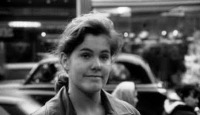 Before there was an “Ugly Betty”, there was “Georgy Girl” (1966). The film lights down in London town during those mad 1960s with the crazy new sounds coming out of bands like “The Seekers” and the even crazier new hairdos and mini skirts. We see Georgy girl (Lynn Redgrave) awkwardly sporting one of the new “dos” as the opening credits roll over top of the chart topping
Before there was an “Ugly Betty”, there was “Georgy Girl” (1966). The film lights down in London town during those mad 1960s with the crazy new sounds coming out of bands like “The Seekers” and the even crazier new hairdos and mini skirts. We see Georgy girl (Lynn Redgrave) awkwardly sporting one of the new “dos” as the opening credits roll over top of the chart topping 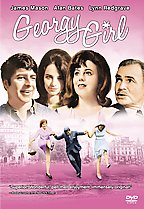 number by the Australian band. (I was surprised to learn that they weren’t a part of the British invasion.) The film is a lot like the title song in that it is a lighthearted romp with surprisingly serious undertones for those who are really listening.
number by the Australian band. (I was surprised to learn that they weren’t a part of the British invasion.) The film is a lot like the title song in that it is a lighthearted romp with surprisingly serious undertones for those who are really listening.
The story line is a bit mixed up, much like Georgy herself. Georgy’s beautiful and free-spirited roommate, Meredith, leaves behind a boyfried and a baby as she gets on with her life after an ever so brief encounter with her own non-maternal nature. Georgy tries to pick up the pieces. After all, there is an adorable, helpless child involved. The make-shift domestic arrangements with Jos, the baby’s father, soon fall apart. A cast-off boyfriend doesn’t really fit any 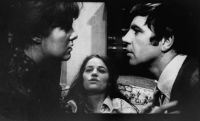 better than the ridiculous coiffure that Georgy tries on in the film’s introduction. In true improvisational style that fits the times and Georgy’s quirky personality, she tries on a completely different set of circumstances by accepting her family’s employer as stand-in dad. James Leamington (played by James Mason) is supposedly Georgy’s better in social standing - although one wonders if he isn’t actually her “worser” after he offers her an albeit “very proper” and attractive contractual arrangement for Georgy to be his mistress. Georgy passes up the offer. She’d like to think she can do better. She changes her mind (like a girl changes clothes) when the offer firms up a bit more and becomes a proposal of marriage after Leamington’s wife conveniently takes herself out of the way by dying.
better than the ridiculous coiffure that Georgy tries on in the film’s introduction. In true improvisational style that fits the times and Georgy’s quirky personality, she tries on a completely different set of circumstances by accepting her family’s employer as stand-in dad. James Leamington (played by James Mason) is supposedly Georgy’s better in social standing - although one wonders if he isn’t actually her “worser” after he offers her an albeit “very proper” and attractive contractual arrangement for Georgy to be his mistress. Georgy passes up the offer. She’d like to think she can do better. She changes her mind (like a girl changes clothes) when the offer firms up a bit more and becomes a proposal of marriage after Leamington’s wife conveniently takes herself out of the way by dying.
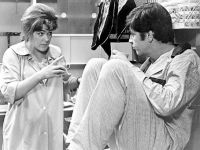 In the end, it is a marriage of convenience that Georgy chooses as her best fit in the era of the sexual revolution. It is perhaps the best option afforded to someone like Georgy “who just missed being beautiful”. One wonders how well this arrangement is going to work out over time, as we watch the closing scene where the new bride repeatedly caresses her adopted infant. She seems oblivious to the groom sitting next to her in the get away car. It may well end up as just another failed experiment to be washed away down the drain along with the hair pins and mascara of Georgy’s “new look” in the opening scene.
In the end, it is a marriage of convenience that Georgy chooses as her best fit in the era of the sexual revolution. It is perhaps the best option afforded to someone like Georgy “who just missed being beautiful”. One wonders how well this arrangement is going to work out over time, as we watch the closing scene where the new bride repeatedly caresses her adopted infant. She seems oblivious to the groom sitting next to her in the get away car. It may well end up as just another failed experiment to be washed away down the drain along with the hair pins and mascara of Georgy’s “new look” in the opening scene.
Georgy’s pick of the best offer out of a limited range of options appears to be missing something: unconditional commitment and acceptance of people for who they really are. It’s what Georgy really wants; it’s what all of us want in the end –free love.
Don’t miss the SNAM Interviews on the subject of “Beauty -and Other Myths”. The Interviews deal extensively with another movie with a parallel theme shown in conjunction with “Georgy Girl” The second feature was “Dogfight”.
>>Real Life: Michelle participated in “The Biggest Loser” contest in order to lose weight. She found unexpected healing that led to a more permanent change in her life.
>>More to see: Looking for more out of life?
See the TVO video trailer for "Georgy Girl" (1966)
In and Out (1997)
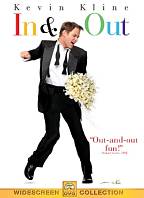 “In and Out” (1997) starring Kevin Kline, Tom Selleck and Joan Cusack is all about the influence of Hollywood on the lives of everyday people living in ordinary places. But isn’t it about a gay high school teacher coming out of the closet? But I thought it was about an unassuming English teacher “being outed” by his former pupil who happened to make a chance remark about his former teacher’s sexual orientation while receiving an Academy
“In and Out” (1997) starring Kevin Kline, Tom Selleck and Joan Cusack is all about the influence of Hollywood on the lives of everyday people living in ordinary places. But isn’t it about a gay high school teacher coming out of the closet? But I thought it was about an unassuming English teacher “being outed” by his former pupil who happened to make a chance remark about his former teacher’s sexual orientation while receiving an Academy 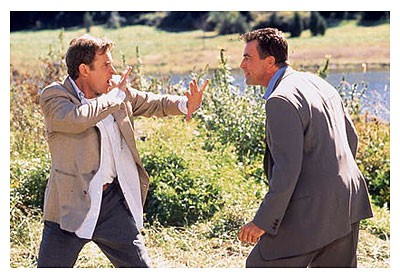 Award. It is all rather confusing. Some people, like Tom Selleck’s character, bigwig reporter Peter Malloy, seem to have perfect clarity about these things. But as for Mr. Howard Brackett himself (Kevin Kline), his fiancée (Joan Cusack), his parents, his friends and pretty much the rest of the world, it all comes as a big surprise.
Award. It is all rather confusing. Some people, like Tom Selleck’s character, bigwig reporter Peter Malloy, seem to have perfect clarity about these things. But as for Mr. Howard Brackett himself (Kevin Kline), his fiancée (Joan Cusack), his parents, his friends and pretty much the rest of the world, it all comes as a big surprise.
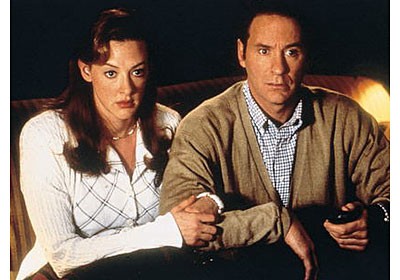 Naturally enough, neither Mr. Brackett nor his fiancée of quite some time were at all suspicious as they carried on with their extraordinarily commonplace lives. And quite naturally, everything and everyone is thrown into a tizzy once the big “revelation” has been announced on national television. From there on in, everything gets re-examined, re-decided and recast simply on the say-so of the newly minted Hollywood star (played by Matt Dillon). The aftershock comes with quite hilarious results,
Naturally enough, neither Mr. Brackett nor his fiancée of quite some time were at all suspicious as they carried on with their extraordinarily commonplace lives. And quite naturally, everything and everyone is thrown into a tizzy once the big “revelation” has been announced on national television. From there on in, everything gets re-examined, re-decided and recast simply on the say-so of the newly minted Hollywood star (played by Matt Dillon). The aftershock comes with quite hilarious results, 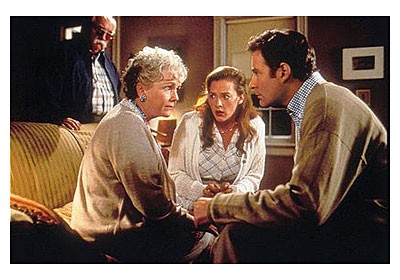 naturally enough. But naturally I wonder who has the bigger problem – Howard Brackett with his questions about his sexual orientation or the rest of us who appear to be so disposed as to believe anything we hear (as long as it is salacious and announced on national television). Fortunately for all concerned, “In and Out” is a comedy and the explorations of the vagaries of human nature remain lighthearted and are often treated in a quite funny manner.
naturally enough. But naturally I wonder who has the bigger problem – Howard Brackett with his questions about his sexual orientation or the rest of us who appear to be so disposed as to believe anything we hear (as long as it is salacious and announced on national television). Fortunately for all concerned, “In and Out” is a comedy and the explorations of the vagaries of human nature remain lighthearted and are often treated in a quite funny manner.
>> Real Life Story: DJ was a young man who was confused about a lot of things in life. Eventually he banged into some hard realities that led to deep life change.
>>More to see: Looking for more out of life?
Don't miss the entire dance sequence in Howard's "Real Men Don't Dance" routine. Catch the trailer for "In and Out" (1997).
Places in the Heart (1984)
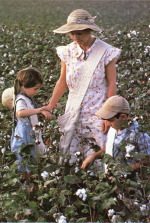 In “Places in the Heart” (1984), writer/director Robert Benton delivers a poignant portrait of a way of life as it once was in the deep South during the Depression era. Edna Spalding (played by Sally Field) finds herself in an unexpected place, facing life as a widow with two young children after her husband is suddenly killed. Edna seems to represent many women of her
In “Places in the Heart” (1984), writer/director Robert Benton delivers a poignant portrait of a way of life as it once was in the deep South during the Depression era. Edna Spalding (played by Sally Field) finds herself in an unexpected place, facing life as a widow with two young children after her husband is suddenly killed. Edna seems to represent many women of her  generation. She is ill-prepared to deal with the harsh realities of being a single parent in what is still very much a man’s world. She doesn’t even know how to write out a cheque, much less run a farm and earn a living. Sally Field’s character demonstrates courage, warmth and toughness in the face of overwhelming odds as she attempts to
generation. She is ill-prepared to deal with the harsh realities of being a single parent in what is still very much a man’s world. She doesn’t even know how to write out a cheque, much less run a farm and earn a living. Sally Field’s character demonstrates courage, warmth and toughness in the face of overwhelming odds as she attempts to 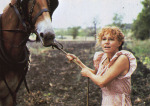 keep her family together during a deep economic and personal crisis.
keep her family together during a deep economic and personal crisis.
Danny Glover’s portrayal of the character Moze, a migrant worker who ends up helping Edna to work the farm and bring in the cotton, captures the essence 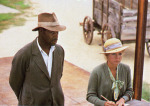 of the situation of the black man in this period of time. Moze searches not only for work to keep body and soul together, but for dignity to make life worth living. He finds both for just a moment with Mizz Spalding on a little farm just outside of the small town of Waxahachie, Texas.
of the situation of the black man in this period of time. Moze searches not only for work to keep body and soul together, but for dignity to make life worth living. He finds both for just a moment with Mizz Spalding on a little farm just outside of the small town of Waxahachie, Texas.
 John Malkovich plays Mr. Will, a complicated character whose injuries from the First Great War involve more than just the loss of his eyesight. As a boarder in the household, Mr. Will temporarily finds a place to belong and a group of people who need him almost as much as he needs to be needed.
John Malkovich plays Mr. Will, a complicated character whose injuries from the First Great War involve more than just the loss of his eyesight. As a boarder in the household, Mr. Will temporarily finds a place to belong and a group of people who need him almost as much as he needs to be needed.
Benton frames his semi-autobiographical work with bookends in the form of two hymns that open and close the film. (See below) These scenes set up a 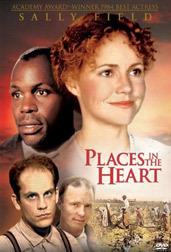 context for understanding the rest of the action of the film. As with the folksy irregular rhythm of the cotton pickin’ ballads in the middle of the movie, the music comes out of the real life experiences of the townspeople. The music is presented as something that’s a part of what the people here really live. It’s not just an ornamental backdrop for the dramatic action.
context for understanding the rest of the action of the film. As with the folksy irregular rhythm of the cotton pickin’ ballads in the middle of the movie, the music comes out of the real life experiences of the townspeople. The music is presented as something that’s a part of what the people here really live. It’s not just an ornamental backdrop for the dramatic action.
The final scene with the communion in church raises particular issues. Everything else in the film has been firmly anchored in reality until the final frames of the film. Why is it that unreality suddenly takes over? Edna’s dead husband and his killer, the young black man, who was brutally killed by a lynch mob, suddenly appear sitting in church. Sitting there in the pew, they seem as normal as every other member of the community as the communion plate is passed. My thought is that it has to do with what  Robert Benton wants to show us about his main characters and the community they live in. “Places in the Heart” may be a memory of a place and a time that no longer exist. The magic in it is that Benton manages to help us to understand something of what it was like to live there and then, just as he lived it.
Robert Benton wants to show us about his main characters and the community they live in. “Places in the Heart” may be a memory of a place and a time that no longer exist. The magic in it is that Benton manages to help us to understand something of what it was like to live there and then, just as he lived it.
See the TVO Saturday Night at the Movies in depth Interviews as the subject of "Surviving the Depression" is treated in two films shown on SNAM: "Places in the Heart" (1984) and "Pennies from Heaven"(1981).
>>Real Life: Everything in life seemed to be going fine. That all changed the day Tamara learned she had incurable cancer and was faced with only a few uncertain years to live. Where do you turn when confronted with a no-win situation?
>>More to see: Looking for more out of life?
See the framing opening and closing scenes with accompanying music from "Places in the Heart".
Priest (1994)
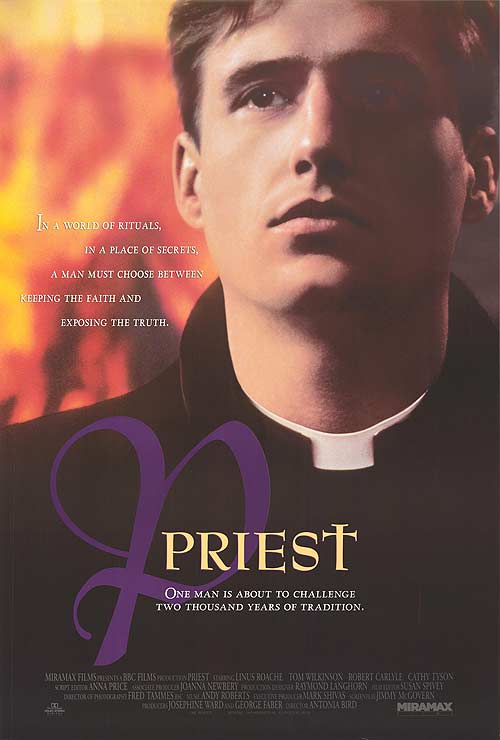 “Priest” (1994) is a difficult movie tackling a difficult subject. It holds up for scrutiny the many conflicts of being a modern-day Roman Catholic priest. Upon arrival at his new parish, Father Pilkington (Linus Roache) quickly becomes embroiled in a series of no-win situations. His fellow priest (Tom Wilkinson) is
“Priest” (1994) is a difficult movie tackling a difficult subject. It holds up for scrutiny the many conflicts of being a modern-day Roman Catholic priest. Upon arrival at his new parish, Father Pilkington (Linus Roache) quickly becomes embroiled in a series of no-win situations. His fellow priest (Tom Wilkinson) is 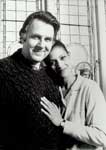 having a clandestine affair with the maid; a young parishioner reveals while in the confessional that she is the victim of incest; and he himself is caught in compromising circumstances in an ongoing homosexual relationship. The ready answers of Father Greg’s conservative version of Roman Catholic faith appear to be no match for the very real problems of real life in his very ordinary English parish. A crisis of faith ensues for Father Greg. His fellow clergy and the parish in general are dragged along unwittingly and unwillingly.
having a clandestine affair with the maid; a young parishioner reveals while in the confessional that she is the victim of incest; and he himself is caught in compromising circumstances in an ongoing homosexual relationship. The ready answers of Father Greg’s conservative version of Roman Catholic faith appear to be no match for the very real problems of real life in his very ordinary English parish. A crisis of faith ensues for Father Greg. His fellow clergy and the parish in general are dragged along unwittingly and unwillingly.
Although most of the crises in the film revolve around the 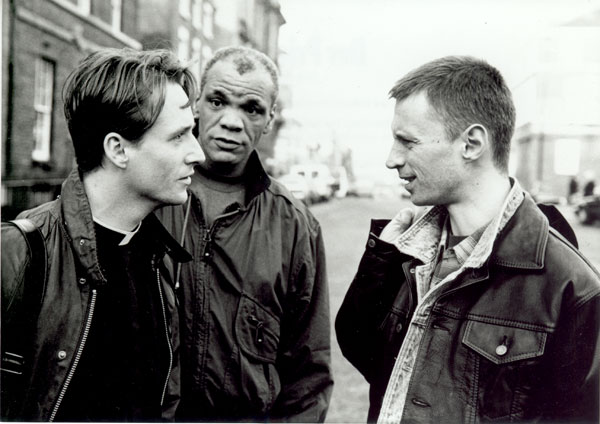 depiction of a mangled sexuality, on a more global level, the sex is just a window through which to see more deeply into the soul, into what it means to be human. In spite of the brouhaha that the film engendered when originally released, this film endures in its
depiction of a mangled sexuality, on a more global level, the sex is just a window through which to see more deeply into the soul, into what it means to be human. In spite of the brouhaha that the film engendered when originally released, this film endures in its 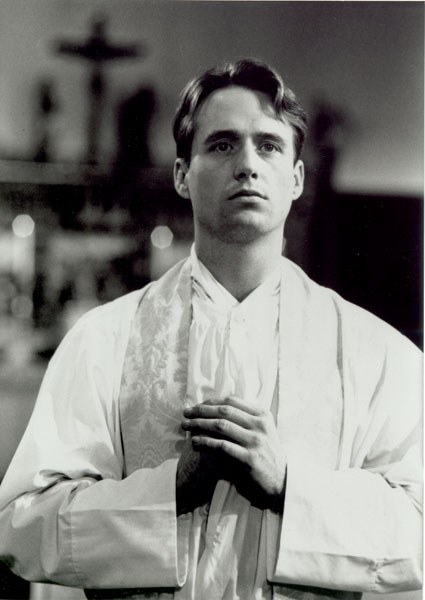 unflinching look at a certain situation in the Church today. That being said, the film is not totally devoid of either the hope or the redemption that the Church is supposed to be famous for. Like the rest of what is depicted in the film, it’s just not that simple.
unflinching look at a certain situation in the Church today. That being said, the film is not totally devoid of either the hope or the redemption that the Church is supposed to be famous for. Like the rest of what is depicted in the film, it’s just not that simple.
Also shown on Saturday Night at the Movies was another film underscoring high drama resulting from the secrecy of the confessional, Alfred Hitchcock’s “I Confess”.
>>More to see: Looking for more out of life?
See the video trailer for "Priest" (1994). See also the climactic final scene of the movie here.
Starting Out in the Evening (2007)
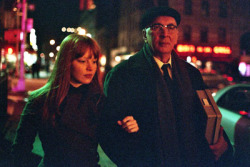 “Starting Out in the Evening” (2007) is actually a film about more than just writers and the craft of writing. It’s about family, career, ambition, following one’s passions, facing death and disappointments . . . and probably a few other things along the way.
“Starting Out in the Evening” (2007) is actually a film about more than just writers and the craft of writing. It’s about family, career, ambition, following one’s passions, facing death and disappointments . . . and probably a few other things along the way.
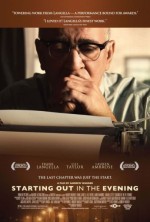 Some may find the film a bit slow and obsessively internally focused. What else can one expect? After all, it’s about the world and the process of being a writer, for goodness sake. (Well, actually, we’re not really too sure for whose sake any of this writing stuff is really for in the end. It seems to me that the film desperately wants to convince us that art for art’s sake is its own reason for being.)
Some may find the film a bit slow and obsessively internally focused. What else can one expect? After all, it’s about the world and the process of being a writer, for goodness sake. (Well, actually, we’re not really too sure for whose sake any of this writing stuff is really for in the end. It seems to me that the film desperately wants to convince us that art for art’s sake is its own reason for being.)
Leonard Schiller has lived the life of a New York intellectual. He now has lots of time to reflect on whether it has all been worth it as he faces the illness and incapacity of old age. He’s been stuck with a bad case of writer’s block for years now. It is high time to face up to the truth: neither he nor the characters of his latest novel are going anywhere. A bright young grad student (Lauren Ambrose) intent on 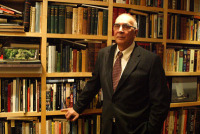 building her own career helps Schiller to realize that he has been following his characters around for years in vain, “waiting for them to do something interesting”. Schiller is faced in the end with a moral dilemma that cuts to the core of his artistic and personal integrity. Does he have the courage to face life the way it really is with its disappointments and limitations and still engage fully in the creative process? Will he do it this time in a wiser, less self-centred way?
building her own career helps Schiller to realize that he has been following his characters around for years in vain, “waiting for them to do something interesting”. Schiller is faced in the end with a moral dilemma that cuts to the core of his artistic and personal integrity. Does he have the courage to face life the way it really is with its disappointments and limitations and still engage fully in the creative process? Will he do it this time in a wiser, less self-centred way?
Schiller’s daughter, Ariel, has a different dilemma. Her life as a former dancer is anchored in a much more physical day-to-day reality, in 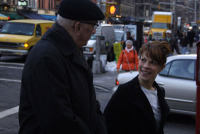 contrast to her father’s intellectual pursuits. Ariel has to face her own moral dilemmas and internal wrestlings as she processes what it means to her to be pushing 40 and still be childless. Conflicted desires and yearning for fulfillment bubble up as she faces the mandatory “early retirement” of her dancing career and encounters a former lover who has other priorities in life. (See the video clip.)
contrast to her father’s intellectual pursuits. Ariel has to face her own moral dilemmas and internal wrestlings as she processes what it means to her to be pushing 40 and still be childless. Conflicted desires and yearning for fulfillment bubble up as she faces the mandatory “early retirement” of her dancing career and encounters a former lover who has other priorities in life. (See the video clip.)
Not the film to see if you’re in the mood for an adrenalin rush or up for mindless movie-watching with lots of microwave popcorn on hand . . . It certainly does have its merits though. If you’re not in a rush, why not spend a couple of hours mulling things over with this engaging piece of cinema.
>>More to see: Looking for more out of life?
>>Real Life Story: Successful author, Anne Rice, tells of how the exploration of her personal demons led to writing a series of vampire novels before taking a surprising twist later on in her professional life.
Understand more about "The Written Life" as depicted in SNAM's Interviews about two films which take on the subject of authors and the work of the author. The films described in the Interviews are "Starting Out in the Evening" (2007) and "Infamous" (2006).
See the trailer for "Starting Out in the Evening" (2007)




